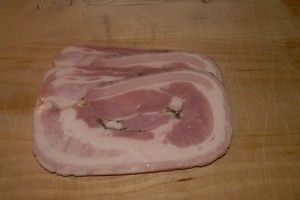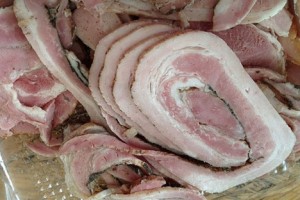Birgitte Kallipolitis, an associate professor in the Department of Biochemistry and Molecular Biology at the University of Southern Denmark, and colleagues report their findings in the journal Nucleic Acids Research.
 Listeria, a bacterium that sometimes occurs in unprocessed and processed foods, causes an infection called listeriosis. Most infections only result in mild symptoms such as fever, vomiting and diarrhea, which take about 3 days to pass and do not normally require treatment.
Listeria, a bacterium that sometimes occurs in unprocessed and processed foods, causes an infection called listeriosis. Most infections only result in mild symptoms such as fever, vomiting and diarrhea, which take about 3 days to pass and do not normally require treatment.
But in rare cases, listeriosis can spread to other parts of the body and cause severe conditions like meningitis, which is typically accompanied by severe headache, stiff neck and tremors.
Unborn babies can also contract a listeria infection from the mother via the placenta.
The US Centers for Disease Control and Prevention (CDC) estimate that around 1,600 Americans fall ill with listeriosis and 260 die from it every year. In Denmark – a country with a population some 60 times smaller than that of the US – over the last few weeks alone, 28 people have fallen ill and 13 have died from listeriosis caused by eating processed foods bought in supermarkets. Prof. Kallipolitis says Listeria is notoriously difficult to fight because it is extremely able to adapt to changes in its surroundings. This was the subject of their study, which reveals some important clues about how Listeria manages to retain the ability to invade cells while at the same time escape the attention of the immune system.
For their study, they examined what happens at the microbiological level when Listeria is exposed to some of the substances known to be challenging to bacteria – such as antibiotics, bile, salt, ethanol and acid, many of which it encounters in processed and unprocessed foods in the human body and also in disinfected environments.
Prof. Kallipolitis says, “We knew that Listeria can resist these substances, but we did not quite know how.” She and her colleagues found the bacterium uses various strategies to resist the substances.
“Generally speaking, Listeria must be described as extremely adaptable. It is constantly aware of its surroundings and if the environment changes around it. It reacts instantly and has a number of strategies to withstand threats,” she explains.
Listeria infects host cells by producing special proteins. In order for infection to be successful, the bacterium must keep the production of the proteins under a certain level – for above this level the host immune system becomes aware of it and attacks the pathogen.
The researchers discovered that when they exposed Listeria in the lab to the various anti-pathogen substances like bile, salt, ethanol and antibiotics, the bacterium started releasing special RNA molecules, as Prof. Kallipolitis explains:
“With these RNA molecules the bacteria can adjust how much or how little to produce of various proteins. For example it can downgrade the production of the protein LapB, which it uses to enter our cells. If this production is not downgraded, the bacterium will potentially be detected and fought by the immune system.”
The team also found that these same RNA molecules help Listeria keep watch on its cell walls in the face of danger. Antibiotics work by attacking the cell walls of bacteria. But when Listeria is exposed to antibiotics, it rapidly detects the assault on its cell walls and sets about repairing them.
The researchers observed that in the lab, Listeria only produces the special RNA molecules when exposed to one of the challenging substances. The bacterium did not produce them when there was no challenge.
Prof. Kallipolitis says this “reveals part of the mechanism behind Listeria’s extreme adaptability.”
The team now plans to find out if removing the RNA molecules renders Listeria harmless.
 “If you eat this cheese, you risk being infected with salmonella,” warns Fødevarestyrelsen in the newspaper.
“If you eat this cheese, you risk being infected with salmonella,” warns Fødevarestyrelsen in the newspaper.









